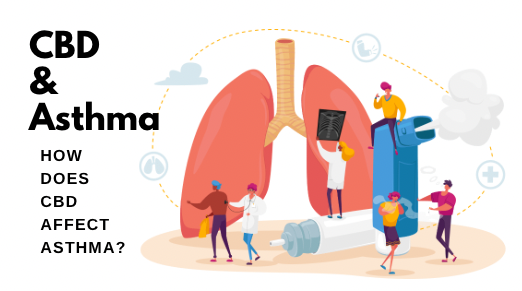
Can CBD Help with Asthma?
CBD and Asthma : Can CBD Help with Asthma?

| Last updated: November 1, 2021
Asthma is a common chronic respiratory illness that starts in the lung airways as a result of inflammation and swelling. As these airways become constricted, they get filled with mucus, making it difficult to breathe properly.
The World Health Organization (WHO) reports that around 339 million people suffer from asthma worldwide.
According to various estimates, Asthmatics make for roughly 8% of the U.S. general population. The Centers for Disease Control and Prevention (CDC) reports that 10 Americans are diagnosed with asthma every day.
The symptoms of asthma include:
- Wheezing
- Coughing
- Shortness of breath
- Pain and/or tightness in the chest
- Difficulty falling asleep
The symptoms may vary from person to person. They can also manifest at different events, such as during cold weather, when exercising, or being exposed to allergens.
Not all patients have severe asthma; for many people, this is a mild condition. However, others may have serious problems, such as severe asthma attacks, which can be life-threatening.
Studies on CBD and Asthma
Inflammation in the lungs is the main trigger of asthma flare-ups. When a patient gets exposed to irritants, such as allergens, the immune system brings an inflammatory response.
Inflamed airways may cause muscle spasms and cause the lungs to secrete too much mucus. As a result, the respiratory airways get clogged, making breathing in and out extremely difficult.
This is where CBD could help.
Researchers believe that CBD can produce remarkable anti-inflammatory effects through its interaction with the CB2 cannabinoid receptors within the endocannabinoid system. The activation of this receptor helps lower the concentration of pro-inflammatory cells such as C fibers.
In a 2019 study published in the European Journal of Pharmacology, the authors found that CBD may curb inflammatory responses and speed up the recovery of lung function in patients with allergy-driven asthma (1).
Similar findings were reported by an earlier study, where the research team concluded that CBD and other cannabinoids can be used to help people deal with respiratory conditions, inflammatory pain, and ischemic stroke (2).
![]() CBD Oil vs Spasms
CBD Oil vs Spasms
An asthma attack causes individuals to experience spasms that can impact the bronchi and bronchioles as a result of the muscle contraction in the lungs, which causes breathing difficulties and wheezing.
The latest research has shown that CBD has antispasmodic properties. As CBD reduces muscle spasms, it can help open the airways in the respiratory tract, relieving asthma symptoms. This property has also been highlighted in the studies designed to determine the therapeutic potential of CBD for epileptic seizures.
A 2015 study investigated the efficacy of Sativex — an oral spray containing a 1:1 ratio of CBD to THC — on patients with multiple sclerosis. The research team reported significant improvements in muscle spasticity and patients’ mobility (3).
Although more longitudinal trials are needed to prove the preclinically established benefits of CBD for asthma, the compound offers potential benefits for people who experience muscle spasms. There’s a chance that CBD may also help relax the muscles in the lungs, making it easier for asthma sufferers to breathe.
If you believe that CBD could help you manage the symptoms of asthma, consult a doctor prior to making a purchase for professional advice.
![]() CBD Oil vs Asthma Drug-Induced Anxiety
CBD Oil vs Asthma Drug-Induced Anxiety
Earlier in the article, we’ve mentioned that conventional anti-asthma medications can trigger anxiety in patients. Chronic anxiety can seriously impact a person’s daily life and is a risk factor for a wide range of mental disorders, including depression, panic disorder, phobias, bipolar disorder, and more.
CBD has demonstrated strong anxiolytic (anti-anxiety) properties in several experimental studies, so there’s a chance you can benefit from using CBD oil in conjunction with your prescribed medication to prevent anxiety (4).
However, since CBD interacts with about 80% of prescription medications, we suggest once again that you visit a doctor before buying CBD oil for asthma.
How to Use CBD for Asthma
CBD for asthma is available in a plethora of forms, including oils, capsules, edibles, vapes, and topicals. The choice of your go-to format depends on the preferred route of administration as well as on your lifestyle. Below we cover the most popular types of CBD products along with their pros and cons.
![]() CBD Oil
CBD Oil
CBD oil is the most popular form of CBD. It is sold in dark, glass bottles with a dropper attached for accurate dosing. CBD oil contains a hemp extract infuse into a carrier oil such as MCT oil, hemp seed oil, or olive oil.
CBD oil comes in a wide range of concentrations and flavors. You can take it under the tongue and hold it there for 60 seconds before swallowing — or mix it with food and drinks to mask the strong taste of CBD oil (when taking full-spectrum or broad-spectrum CBD).
When you take CBD oil under the tongue, it absorbs through the many tiny blood vessels, avoiding the first-pass metabolism in the liver. As a result, the first effects are noticeable within 15–30 minutes after consumption.
![]() CBD Capsules
CBD Capsules
Capsules are the standard form of most health supplements, including CBD oil. This form of CBD is useful for consistent supplementation with fixed amounts of CBD per serving. However, CBD capsules are subject to the first-pass metabolism in the liver, which lowers its bioavailability. Only 1/5th of the ingested content will enter the bloodstream.
![]() CBD Edibles
CBD Edibles
CBD edibles have become the next trend on the market. They offer a tasty, discrete, and portable way to consume CBD throughout the day. CBD edibles range from gummies to cookies, truffles, lollipops, protein bars, and chocolates.
Gummies are the most popular edible format. They look and taste just like regular gummy bears, with 5 mg to 50 mg of CBD per piece. Similar to capsules, edibles must pass through the liver before entering the bloodstream, so you may have to wait a bit for the effects to show up.
How Much CBD to Take for Asthma
Now that we’ve established that the best type of CBD for asthma is CBD oil, let’s discuss the dosage.
This is the most difficult part of taking CBD for any condition.
There is no one-size-fits-all dosage because everybody reacts differently to CBD. Choosing the right dosage involves several factors, including:
- Age
- Gender
- Weight
- Metabolism
- Unique body chemistry
- Previous experience with CBD
- The type of your asthma symptoms
- Medications for asthma you might be taking
An effective dosage may range from 5 to 300 mg of CBD. Experts in the field recommend starting low and gradually increasing your dose until you experience relief from your symptoms. It’s important that you consult your plans to incorporate CBD into your routine with your doctor. A doctor experienced in cannabis may help you establish the right dosage and avoid potential interactions with other medications.
For more info on CBD Dosing : **8Labs CBD Dosing Guide**
Final Thoughts on CBD and Asthma
Asthma is a chronic respiratory disease that — when left neglected — can pose a real threat to one’s life. Common symptoms of asthma include shortness of breath, coughing, wheezing, and tightness in the chest.
Asthma doesn’t have a cure, meaning you’ll need to aim your treatment at the effective management of your symptoms and prevention of flare-ups. With inhalers, pills, and non-steroidal anti-inflammatory drugs (NSAIDs), it’s possible to live a normal life.
However, regular use of conventional medications has side effects, such as anxiety, depression, and suicidal thoughts on top of physical reactions including a sore throat and tatty voice from using asthma inhalers.
A growing number of people with asthma take CBD as a safe and effective alternative for dealing with symptoms without the aforementioned side effects. Some patients have experienced decent results of combining asthma medication with CBD oil.
A recent report from the WHO states that CBD is a safe and well-tolerated compound in humans.
Although no studies have been performed specifically on the use of CBD for asthma, there is evidence that CBD has a bronchodilatory effect, which can help relax the lungs and ease muscle spasms. Taking full-spectrum CBD oil may result in improved lung function and easier breathing.
If you’re planning to include CBD oil into your routine, we encourage you to make an appointment with your doctor in order to figure out the best dosage for your situation and avoid potential interactions with your anti-asthma medications.
Remember that smoking or vaping CBD isn’t recommended for asthma patients, as both methods entail a risk of deteriorating their symptoms.
 Why Choose 8Labs CBD?
Why Choose 8Labs CBD?

Message from 8Labs Founder & CEO
Hi I'm Erin, owner of 8LABS CBD!
Back in 2017, after throwing out my back and suffering extreme pain, I was left jobless for several days and was desperately looking for anything to help me recover.
A friend recommended trying medical marijuana gummies, which did help me find relief. However, once my pain subsided and I was able to return to work, I knew I needed to find something to achieve the same pain-relieving results, without the psychoactive effects.
After researching and trying it for myself, I found it to be a better way to get the relief I needed, while still allowing me to function normally in my day to day life and at work!
Now, my mission is to continue to tell the world about the wonderful benefits and healing-abilities of CBD. With the goal of delivering only the most pure, clean and powerful products to everyone who needs to find relief!
-Erin Lorenzana

Our hemp has a unique chemical composition. It is extremely rich in CBD and other cannabinoids with less than 0.3% THC. Therefore, our products do not have any negative effects associated with marijuana and THC use. With 8LABS CBD, you receive all the positive benefits of hemp’s full spectrum of components, with absolutely zero psychoactive effects.
8LABS CBD products contain the full spectrum of cannabinoids including CBC, CBG, CBDA, CBN and others. Additionally, our extracts contain terpenes - organic hydrocarbons found in the essential oils of plants. Together CBD, other cannabinoids and terpenes all interact synergistically to create what scientists refer to as an “entourage effect” that magnifies the therapeutic benefits of the plant’s individual components—so that the medicinal impact of the whole plant is greater than the sum of its parts.
We have a strict quality control program including on site chromatography reviews and independent lab tests on each batch of product. These reports confirm that the components of hemp remain potent, completely undenatured, and fully active. We maintain high standards of purity and potency to deliver only the highest grade CBD.
References:
- Vuolo, Francieli et al. “Cannabidiol reduces airway inflammation and fibrosis in experimental allergic asthma.” European journal of pharmacology vol. 843 (2019): 251-259. doi:10.1016/j.ejphar.2018.11.029
- Pini, Alessandro et al. “The role of cannabinoids in inflammatory modulation of allergic respiratory disorders, inflammatory pain and ischemic stroke.” Current drug targets vol. 13,7 (2012): 984-93. doi:10.2174/138945012800675786
- Russo, M., Calabro, R.S. and Bramanti, P. “Sativex in the Management of Multiple Sclerosis-Related Spasticity: Role of the Corticospinal Modulation.” Neural Plast (2015).
- Shannon, S. et al. “Cannabidiol in Anxiety and Sleep: A Large Case Series.” The Permanente Journal (2019), 23: 18–041.
- https://cfah.org/cbd-for-asthma/
- https://pubmed.ncbi.nlm.nih.gov/30481497/

